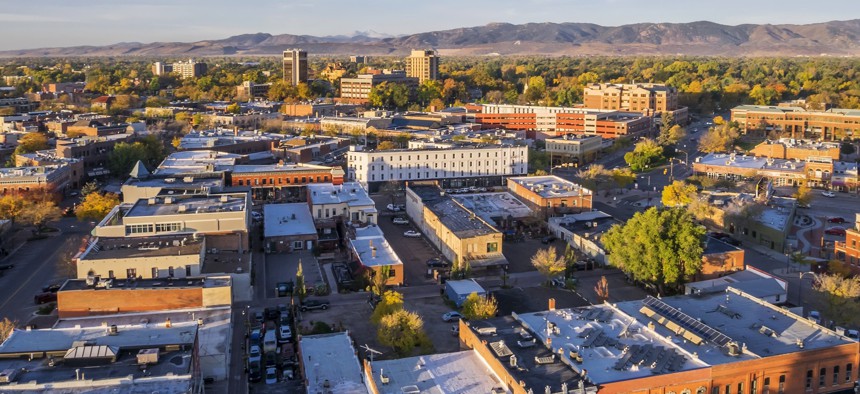Frustrated Colorado Voters Greenlight More Local Broadband Improvements

Fort Collins, Colorado marekuliasz / Shutterstock.com
Many municipalities in the Centennial State are now free to move on their own projects to boost Internet speeds.
BOULDER, Colo. — Coloradans in 45 local elections voted in large majorities on Tuesday to override a 2005 state law pushed by telecommunications companies that bars local governments from managing their own broadband Internet service.
The Colorado Communications and Utilities Alliance has been tracking the issue for years and President Todd Barnes told Route Fifty on Wednesday that residents voted to lift the ban in all of the 27 cities and all of the 18 counties that included a measure on their ballots.
“And the votes weren’t even close,” Barnes said. “I think the smallest margin of [support] was like 70 percent.”
Now those municipalities are free to proceed to improve their broadband service however they choose, whether that means building their own fiber-optic networks, as Longmont north of Denver has done, or partnering with the private sector.
This week’s election wins fuel a wave across the state that has seen frustrated residents pushing for a decade to upgrade spotty and often slow Internet service that they say has hobbled local economic and cultural activity—both in the rural areas of the state and in the relatively populous Front Range cities, which host technology startup communities and top-flight research institutions.
Fort Collins, home to the flagship Colorado State University campus, voted 83 percent in favor of lifting the ban on Tuesday.
That nearly matches the vote in Boulder, home to the flagship University of Colorado campus. A year ago, more than 84 percent of residents voted to lift the ban. Boulder is now conducting a feasibility study, looking at partnership possibilities.
Barnes said that he has been president of the state’s Communications and Utilities Alliance for five years and that the question of how to best work around the ban on public-sector broadband management has been at the top of the priorities list the whole time.
“I’m not surprised in the least with the results of yesterday’s elections,” he said. “We have been hearing this drumbeat my entire tenure from communities that have felt hobbled by the law.”
Internet providers in Colorado have opposed efforts to lift the ban, spending money on lobbying at the capitol but also on advertising in local issue campaigns.
Colorado is not an easy state for Internet companies to service. BroadbandNow rates Colorado the 32nd in broadband service among the 50 states. The state reports that 894,000 residents have no access to wired Internet service capable of delivering at least a low-grade 25 megabytes-per-second download speed.
The state’s terrain and residential patterns present specific challenges. The Rocky Mountains, of course, split the state nearly down the middle, and vast stretches of the state remain rural and geographically imposing. Yet residents seem to settle in every nook and corner, making blanket wired access to the Internet a difficult proposition. In some rugged stretches, officials will most likely seek to team with companies to boost the efficiency of wireless networks.
Local governments tired of receiving complaints from residents and businesses on the one hand, and excuses from telecommunications companies, on the other, surely gained confidence this year from the broadband experiment underway in Longmont.
In 2013, voters there approved a $40 million bond measure that has so far paid for 17 miles of fiber that serves about 20 percent of the city. The city’s own NextLight system has been rated the fastest Internet network in the country and already has drawn startup and research companies to set up shop in the city.
John Tomasic is a journalist based in Boulder, Colorado.
NEXT STORY: Convicted Felon Back in City Hall; Delaware Residents vs. Smelly Vultures





